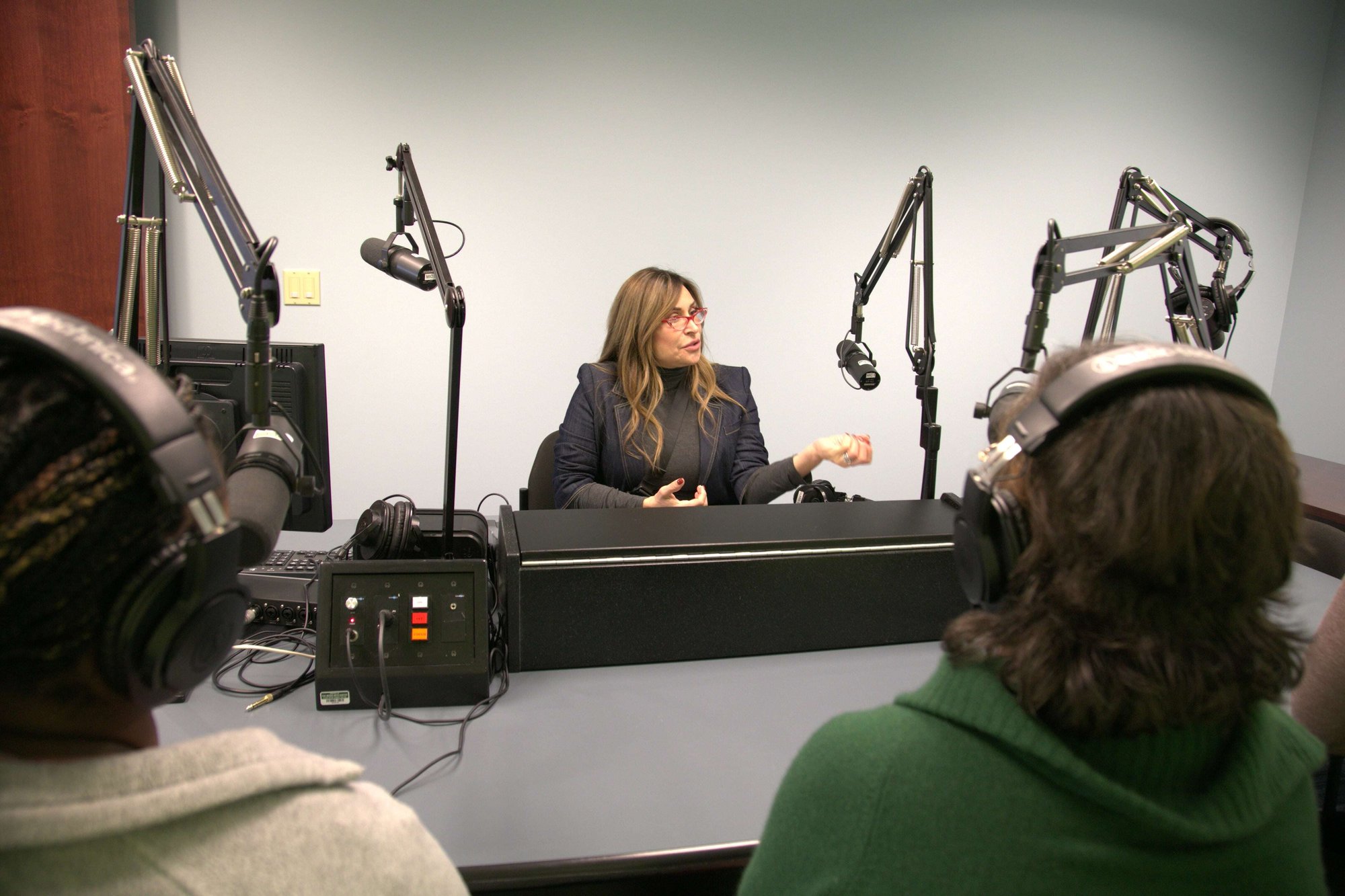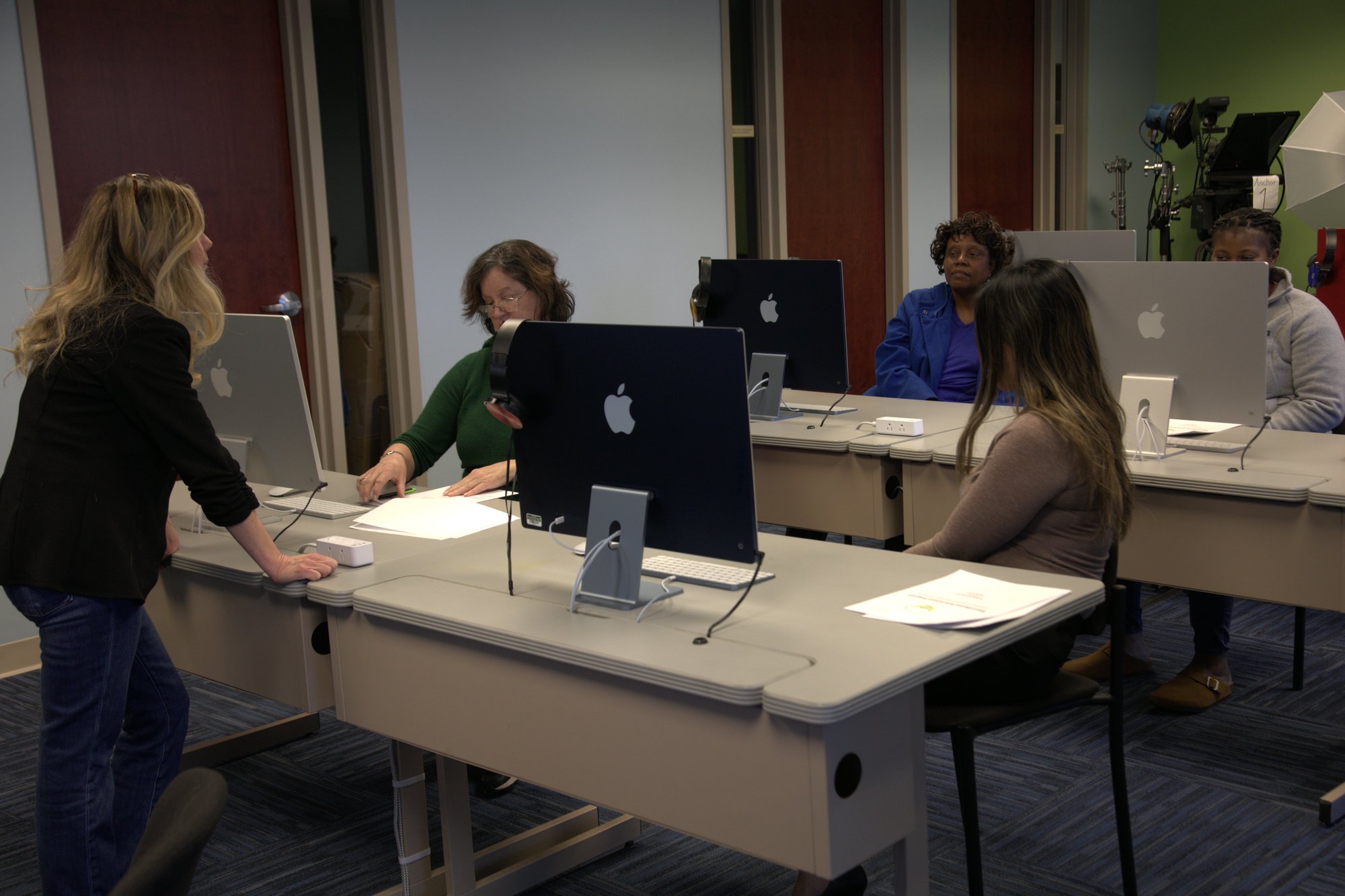Filmmaking intensive Media syllabus
2025 AVOCATIONAL MEDIA TRAINING PROGRAM
Catalog and General Information Supplement
The Media Arts Center
3420 Toringdon Way | Suite 100 |
Charlotte, NC 28277
704-502-1979 | NCMediaArts.com
School Operating Hours
Mon+Wed 8am - 9pm
Tue+Thu 3pm - 6pm
Fridays by Appointment
Program Structure:
- Duration: 24 classes + 24 labs, 3 hours each - 144 total session hours
Format: Interactive workshops, hands-on studio sessions, film screenings, collaborative projects, guest lectures, and film visits.
Courses: 4 core courses, 6 classes each on Mondays and Wednesdays
Start Date: January 15th
End Date: April 14th
Time: 3 pm - 6 pm
Program Structure:
- Duration: 24 classes + 24 labs, 3 hours each - 144 total session hours
Format: Interactive workshops, hands-on studio sessions, film screenings, collaborative projects, guest lectures, and film visits.
Courses: 4 core courses, 6 classes each on Mondays and Wednesdays
Start Date: April 16th
End Date: July 14th
Time: 8 am - 11 am | Mon + Wed
Courses
1. The Art of Screenwriting
- Course Description: Master the fundamentals of storytelling, character development, and screenplay structure.
- Classes:
- Class 1: Storytelling Fundamentals: Exploring narrative structure, plot development, and theme.
- Project: Develop a logline and one-page synopsis for an original film idea.
- Class 2: Character Development: Creating compelling characters with depth and motivation.
- Project: Write a character study for a protagonist and antagonist, including backstory and arc.
- Class 3: Screenplay Structure and Formatting: Mastering the three-act structure and industry-standard formatting.
- Project: Outline a short film script, including key scenes and plot points.
- Class 4: Dialogue and Scene Construction: Writing engaging dialogue and crafting dynamic scenes.
- Project: Write a scene with compelling dialogue that reveals character and advances the plot.
- Class 5: Genre and Style: Exploring different film genres and developing a unique voice.
- Project: Analyze a film scene from your favorite genre and write a similar scene in your own style.
- Class 6: Rewriting and Polishing Your Script: Providing and receiving constructive feedback, revising, and editing.
- Project: Revise your short film outline based on peer feedback and instructor guidance.
- Class 1: Storytelling Fundamentals: Exploring narrative structure, plot development, and theme.




2. Cameras and Lighting: The Visual Language of Film
- Course Description: Master the technical and creative aspects of cinematography, including camera operation, lighting, and composition.
- Classes:
- Class 7: Camera Fundamentals: Exploring camera settings, lenses, and shot composition.
- Project: Shoot a series of still photographs using different camera settings and lenses to achieve various effects.
- Class 8: Lighting Fundamentals: Understanding natural light, artificial light, and lighting techniques.
- Project: Set up a basic lighting scheme for a portrait or interview using available light and reflectors.
- Class 9: Cinematography and Visual Storytelling: Using camera movement, framing, and composition to tell a story.
- Project: Shoot a short scene using different camera angles and movements to create a specific mood and atmosphere.
- Class 10: Color and Tone: Understanding color theory, white balance, and color grading.
- Project: Experiment with color grading techniques in post-production to enhance the mood and atmosphere of a scene.
- Class 11: Working with a Cinematographer: Collaboration, communication, and achieving your vision.
- Project: Plan a shoot with a fellow filmmaker, outlining camera angles, lighting, and visual style.
- Class 12: Advanced Cinematography Techniques: Exploring specialized equipment and techniques like Steadicam and drone cinematography.
- Project: Research and present on a specific cinematography technique or style.
- Class 7: Camera Fundamentals: Exploring camera settings, lenses, and shot composition.
3. Casting and Directing Actors
- Course Description: Develop essential skills in casting, directing actors, and bringing characters to life on screen.
- Classes:
- Class 13: The Casting Process: Finding the right actors for your film and conducting auditions.
- Project: Develop a character breakdown and casting call for a short film.
- Class 14: Working with Actors: Building trust, communication, and providing effective direction.
- Project: Direct a scene with actors, focusing on character motivation and objectives.
- Class 15: Directing Styles and Techniques: Exploring different directing approaches and finding your own voice.
- Project: Analyze a scene from a film and identify the director's style and techniques.
- Class 16: Building a Scene: Blocking, rehearsal, and capturing performances on camera.
- Project: Plan and rehearse a scene with actors, then shoot the scene with a camera.
- Class 17: Working with a Crew: Collaboration, communication, and leadership on set.
- Project: Participate in a mock film shoot, taking on different crew roles.
- Class 18: Directing Different Genres: Adapting your directing style for comedy, drama, action, and other genres.
- Project: Direct a short scene in a specific genre, focusing on the unique challenges and opportunities.
- Class 13: The Casting Process: Finding the right actors for your film and conducting auditions.
4. Editing with Adobe Premiere Pro
- Course Description: Master the art of film editing using Adobe Premiere Pro, from basic cuts to advanced techniques.
- Classes:
- Class 19: Premiere Pro Essentials: Importing footage, organizing projects, and basic editing tools.
- Project: Edit a short sequence of footage, practicing basic cuts and transitions.
- Class 20: Editing for Story and Pacing: Building tension, creating rhythm, and shaping the narrative.
- Project: Edit a short scene, focusing on pacing and emotional impact.
- Class 21: Sound Design and Mixing: Adding music, sound effects, and dialogue to enhance the film.
- Project: Create a soundscape for a short film scene, incorporating music and sound effects.
- Class 22: Color Correction and Grading: Adjusting color and tone to achieve a specific look and feel.
- Project: Color correct and grade a short film scene, creating a consistent visual style.
- Class 23: Advanced Editing Techniques: Exploring visual effects, motion graphics, and advanced transitions.
- Project: Experiment with visual effects and motion graphics to enhance a short film scene.
- Class 24: Exporting and Delivering Your Film: Preparing your film for different platforms and formats.
- Project: Export your edited short film in different formats for online and festival submission.
- Class 19: Premiere Pro Essentials: Importing footage, organizing projects, and basic editing tools.
Assessment:
- Active participation in class discussions and workshops
- Completion of creative projects and portfolio development
- Final project: Produce a short film that showcases your filmmaking skills and creative vision.
Key Outcomes:
- Develop a strong foundation in screenwriting, cinematography, directing, and editing.
- Gain practical experience with industry-standard equipment and software.
- Build a portfolio of filmmaking work to showcase your talent.
- Network with fellow filmmakers and industry professionals.
- Be prepared to pursue a successful career in the dynamic world of filmmaking.
This program, with its emphasis on "learning by doing" and the resources of The Media Arts Center, provides a comprehensive and practical learning experience for aspiring and established filmmaking professionals. By fostering creativity, technical skills, and collaborative learning, this program empowers filmmakers to tell compelling stories and bring their visions to the screen.
FilmMaking Intensive Media
Continue the enrollment process:

-1.jpg?width=600&height=480&name=The%20Media%20Arts%20Center%20LOGO%20(1)-1.jpg)

